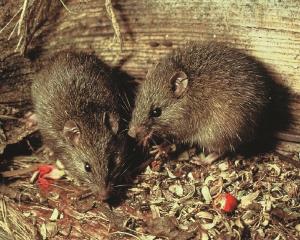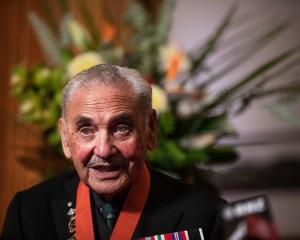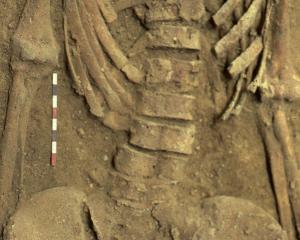
Those who believe South Islanders get a raw deal in a country overendowed with North Island politicians, North Island business owners and North Island welfare beneficiaries might be a little disappointed in new member of Parliament Richard Prosser. The former Alexandra-based "convener" of the South Island Party, that preached separatism in one form or another, is now singing from the New Zealand First hymn book - one country with one flag, one set of laws, one social welfare system... Mark Price reports.
And he is mulling over what to say about his years as champion of a movement at odds with the philosophy of the party that delivered him his new seat in Parliament.
He is one of eight list members for New Zealand First - the party declaring, not surprisingly, it wants to "put New Zealand and New Zealanders first".
But for 14 of Prosser's past political years, he has been discussing the idea that South Islanders need to put the South Island and South Islanders first.
And he still believes one day, South Island "self-determination" will come in some form, even though he might not be alive to see it.
"It's probably generations away unless something dramatic happens in the meantime and you get a big shift in perception and there's some cause for the barrow to be pushed."
He suspects the Auckland supercity might ultimately be the cause of the "big shift".
"If they suddenly start getting a much larger slice of the pie and we are suffering as a result, then obviously sentiment will start becoming a lot stronger."
So, although he retains "sympathy for the movement", Mr Prosser believes a "lack of demand" means he can put aside the interests of South Island separatists for the moment.
"If circumstances change and if the way the South is treated changes then I think there will be demand and that's something you would look at then."
He denies he is simply being expedient.
"It's not a conflict of interest simply because my perception is... that it needs to be demand-driven... and there's not really a demand for it at the moment."
Asked if he would promote South Island separatism in future, Mr Prosser said: "Oh it depends what sort of time frame we are talking.
"I'm not trying to be evasive. I'm just, I'm very cognisant of the fact I'm there wearing one hat and that's what I've campaigned on, and been selected to the party for, and been elected on the basis of, and I don't want to go hijacking it with another agenda."
His views on the South Island movement had "never really come up" in discussions with party leader Mr Peters, he says, but "I have never made any secret of what my history has been. It's all over the net like a rash anyway."
Mr Prosser was born in Auckland and grew up in the Waikato and now lives near Rangiora.
He arrived in Central Otago in 1994 with his partner and spent 10 years working in the wine industry. He lived at Lauder for six years and Alexandra for four.
"It becomes very rapidly apparent that it's a very different sort of a place - the demographics and the values and the pace of life and the way people are; the way they are open and friendly. There's a sense of community in the South Island that they lack in the North, to be honest."
He also noticed a "simmering undercurrent" of separatism or self-determination.
"There's a perception that the South gets ignored, that the South produces most of the wealth and the North spends it ... that southern production goes to subsidise northern welfare.
"It is a concern a lot of people have."
And, he says, some of that revolves around electricity and the belief the South Island does not benefit sufficiently from the power its rivers produce.
For 14 years Mr Prosser was involved in that discussion - with "100-odd" supporters meeting at the middle pub in Alexandra.
"It was a lot of fun. The campaign headquarters were a great place to meet."
But, before the 2008 election, the one-issue "pressure group" ran into a problem as it contemplated becoming a party with the 500-member minimum needed for registration.
"To become a party you have to have policy on everything, and as soon as you have policy on things that people don't agree with, you immediately alienate half the people who might otherwise support you."
So, instead of registering a South Island Party, Mr Prosser helped promote "South Island First" - a "non-partisan, non-political" pressure group.
Its website declares members can belong to any party but the objective is to establish a "southern parliament" to provide the South Island with administrative, economic and financial independence "whilst still retaining a unified New Zealand".
Another of those involved, Kym Parsons, of Nelson, told the ODT South Island First was "a sort of a bit of a mockery" of New Zealand First.
It was Mr Parsons who designed a South Island flag based on the Nordic cross and attempted to set up a New Munster Party to represent the South Island, although it "hasn't taken off".
"I'm certainly all for a bit of independence. I think we would be in a better position if we got rid of the shackles so to speak."
He could see Mr Prosser having his "hands tied a little bit" by being a member of a party that was nationally rather than regionally based.
Mr Parsons believed there might not be the need to "go down the full road to independence" and he backed Mr Prosser's preference for two parliaments to deal with domestic affairs - one in the North and one in the South - and another to handle defence and international affairs.
Mr Parsons said he had noted growing "rivalry" between young North and South islanders.
"It manifests itself a bit when it comes to rugby," he said.
And he considered international visitors were more easily able to recognise the differences in the people and economies of the two islands.
"Nine times out of 10 they'll say they're vastly different."
He believed prosperity flowing from an oil discovery in the Great South Basin might further the South Island independence cause.
Mr Prosser, when asked how an Aucklander had come to be the leader of a South Island movement, replied: "A man can be born in a stable and it doesn't mean he's a horse".
He intends retaining his Rangiora home and will commute to the North Island when necessary.
A word from Winston
New Zealand First leader Winston Peters comments: "Richard wrote an article and expressed an interest in South Island separate interests some time ago".
"A quick look at how the Reserve Bank Act operations have damaged provincial New Zealand export economies probably explains why. He is a NZ First MP now and subscribes to NZ First's manifesto which seeks to redress monetary interests adverse to the South Island."
Not the first ...
One hundred and forty three years ago, too much talk of South Island independence cost one of the founders of the Otago Daily Times his job.
Sir Julius Vogel was unhappy at Otago's gold-rush wealth being spent in the North Island " . . . the chief income of which is derived from buying and re-selling at a profit, the land belonging to the Maori tribes, which these are coerced into parting with."
But the paper's directors believed Vogel's views were causing support for the paper to diminish.
The "colourful", "eccentric", "charismatic" Londoner left Otago for Auckland.
And, in 1873 he became premier of New Zealand, his policies ultimately leading to the central government system New Zealand has today.
The greatest electoral success for South Island separatists in recent times was in 1999 when Dunedin publican Margaret McCarrigan stood for the South Island Party.
Mrs McCarrigan won 912 votes [2.57%] in the Dunedin South electorate - well short of David Benson-Pope's 18,065 [50.9%] - but just behind New Zealand First's Jenny Bloxham who secured 999 votes [2.85%] and ahead of ACT, Christian Heritage and an independent.
Across the country, the party received 2912 votes.













